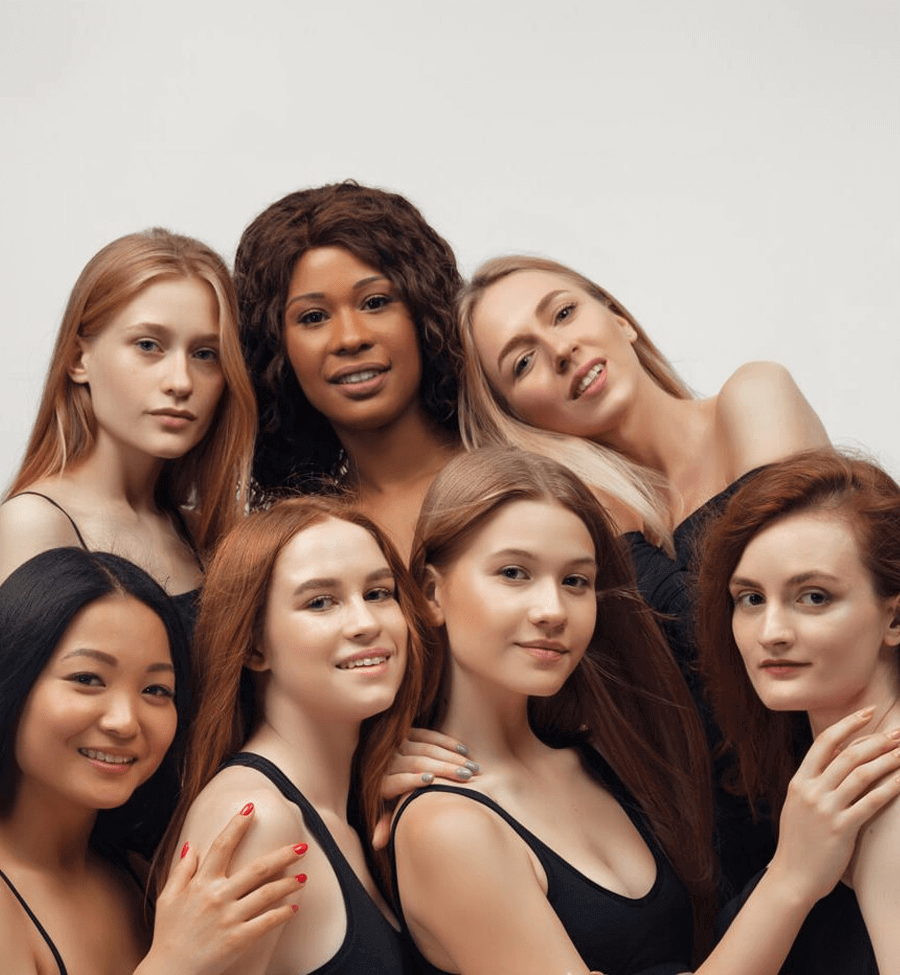Dandruff, a persistent and often irritating scalp condition, affects countless individuals. It's not just a matter of flakes on your shoulders; it can also be associated with hair loss. In this comprehensive guide, we will delve deeper into the world of dandruff, exploring its causes, its connection to hair loss, and effective solutions to regain healthy, dandruff-free hair.
Understanding Dandruff
What Causes Dandruff in Hair?
Dandruff, scientifically known as seborrheic dermatitis, is primarily caused by the overgrowth of a naturally occurring fungus called Malassezia. This fungus feeds on the natural oils produced by your scalp, leading to irritation and flakiness. Understanding the root cause is crucial in effectively addressing dandruff.
Is Dandruff Genetic?
Many individuals wonder if dandruff has a genetic component. While it's not directly hereditary, genetics can play a role in predisposing you to conditions that increase the risk of dandruff. Factors like skin type and the amount of oil your scalp produces can be inherited, making some individuals more susceptible to dandruff than others.
Where Does Dandruff Come From?
Dandruff doesn't have a single origin, but rather a combination of factors. It can result from a combination of oil, yeast, and individual sensitivity. Understanding these factors can help in preventing and managing dandruff effectively.
Can Dandruff Cause Hair Loss?
One of the pressing questions is whether dandruff can lead to hair loss. While dandruff itself may not directly cause hair loss, the persistent itching and inflammation associated with it can lead to excessive scratching. This can damage hair follicles, potentially contributing to hair loss. Moreover, severe dandruff can lead to conditions like folliculitis decalvans, which can result in hair loss. Therefore, it's essential to address dandruff promptly to minimize its impact on your hair.
Worst Dandruff: When It's More Than a Nuisance
For some individuals, dandruff goes beyond the occasional flake. They experience what's often referred to as "worst dandruff," characterized by excessive scaling, itching, and discomfort. Worst dandruff can be a sign of an underlying issue that requires specialized treatment.
Solutions for Dandruff and Hair Loss
Shampoo for Dandruff and Hair Loss
If you're dealing with dandruff and concerned about hair loss, choosing the right shampoo is crucial. Look for anti dandruff shampoos containing active ingredients like ketoconazole, selenium sulfide, or salicylic acid, which can effectively combat dandruff while promoting a healthy scalp environment for hair growth.
Dry Scalp and Hair Loss: Are They Linked?
A dry scalp can exacerbate dandruff and increase the risk of hair loss. To address this, it's essential to keep your scalp adequately moisturized. Consider using a mild, hydrating shampoo and incorporating a moisturizing conditioner into your routine.
Hair Loss and Itchy Scalp: Finding Relief
If you're battling hair loss along with an itchy scalp, it's crucial to address both concerns simultaneously. Consult a dermatologist for a comprehensive evaluation and personalized treatment plan.
Dandruff Hair Loss Shampoo: An Effective Remedy
Specialized dandruff hair loss shampoos contain ingredients that target dandruff while nourishing the hair and scalp. These shampoos can help maintain a healthy scalp environment, promoting hair regrowth.
Prevention and Management
How to Remove Dandruff Permanently
While dandruff can be persistent, it's possible to remove it permanently with the right approach. Consistent use of anti-dandruff shampoos, maintaining good scalp hygiene, and a balanced diet can all contribute to a dandruff-free scalp.
Chronic Dandruff: Battling the Persistent Foe
Chronic dandruff may require more intensive treatment. Dermatologists can prescribe medicated shampoos or topical treatments to manage severe cases effectively.
Stress and Dandruff: The Stress-Hair Connection
Stress can worsen dandruff and hair loss. Consider adopting stress management techniques such as meditation, yoga, or exercise to protect both your mind and your hair.
The Importance of Hair Care
Hair Oils: Your Hair's Best Friend
Natural oils like coconut oil and almond oil provide deep nourishment to your hair and scalp. Regular oil treatments can strengthen your hair and reduce the risk of dandruff.
Heat Styling: Proceed with Caution
Excessive use of heat styling tools can damage your hair, especially if you already have dandruff. Limit the use of these tools and always apply a heat-protective spray before styling to minimize the risk of hair loss.
The Right Tools Make a Difference
Investing in high-quality brushes and combs can prevent hair breakage and promote healthy hair growth. Look for brushes with natural fibers like boar bristles for gentle detangling.
Dive into the world of premium, natural skincare and hiar care—visit us online.
Seasonal Care for Your Mane
Winterize Your Hair Care Routine
During the winter months, cold and dry air can exacerbate dandruff and hair issues. Consider using heavier moisturizers and oil-based serums to lock in moisture and protect your hair from the elements.
Sun, Sea, and Hair Safety
In the summer, prolonged sun exposure and chlorine from swimming pools can wreak havoc on long hair. Use leave-in conditioners with SPF and wear hats to shield your precious strands from UV damage and chlorine.
The Psychological Benefits of Good Hair
More than Just Looks
Having healthy, dandruff-free hair goes beyond aesthetics. It can significantly impact your confidence and overall mood. A good hair day can boost your self-esteem and make you feel more positive and attractive.
Conclusion
In conclusion, dandruff is a common issue, but it doesn't have to define your hair journey. By understanding its causes, the connection to hair loss, and adopting effective remedies and preventive measures, you can regain the confidence and beauty of healthy, dandruff-free hair.
FAQs
Is dandruff genetic, and can I inherit it from my family?
Dandruff itself is not a directly genetic condition, but genetics can play a role in predisposing individuals to factors that contribute to dandruff. Skin type, oil production, and sensitivity to certain fungi can have a hereditary component. While you may not inherit dandruff itself, you might inherit traits that make you more susceptible to it.
How long does it take to get rid of dandruff permanently?
Achieving permanent relief from dandruff varies from person to person. Consistency is key. With the right anti-dandruff products and proper scalp care, many individuals can effectively manage and significantly reduce dandruff over time. However, dandruff can return if underlying causes like fungal overgrowth are not addressed.
What is the best shampoo for dandruff and hair loss?
The best shampoo for dandruff and hair loss typically contains active ingredients such as ketoconazole, selenium sulfide, or salicylic acid. These ingredients combat dandruff by targeting the fungi responsible while creating a favorable scalp environment for healthy hair growth. Consult with a dermatologist to determine the most suitable product for your specific needs.
Can stress cause dandruff and hair loss?
Stress can indirectly contribute to dandruff and hair loss. Chronic stress may weaken the immune system, making the scalp more susceptible to fungal infections linked to dandruff. Additionally, stress-related hair loss is a known concern. Effective stress management through relaxation techniques is crucial for maintaining overall scalp health.
Do hair oils like coconut oil help with dandruff?
Yes, natural oils like coconut oil can provide relief for dandruff-prone scalps. Coconut oil possesses antifungal properties that can help combat the fungi associated with dandruff. Applying warm coconut oil to the scalp, leaving it on for a few hours before washing, can be soothing and may contribute to improved scalp health.
Is it true that head and shoulders shampoo can cause hair loss?
There is no direct evidence to suggest that Head and Shoulders shampoo causes hair loss. It is a popular anti-dandruff shampoo, and hair loss may occur for various reasons unrelated to the shampoo. If you experience hair loss while using any product, consult with a dermatologist to determine the underlying cause and explore suitable alternatives.
How does dandruff affect the growth of long hair?
Dandruff can hinder the growth of long hair by causing scalp irritation and inflammation. Persistent itching and scratching can damage hair follicles, potentially leading to hair loss or slowed hair growth. Effective dandruff management is essential to maintain the health and growth of long hair.
Are there any natural remedies for chronic dandruff?
Yes, several natural remedies can help manage chronic dandruff. Tea tree oil, known for its antifungal properties, can be applied to the scalp. Aloe vera gel and diluted apple cider vinegar are also commonly used to alleviate dandruff symptoms. However, the effectiveness of these remedies can vary among individuals. It's advisable to consult with a dermatologist for a personalized treatment plan for chronic dandruff.



